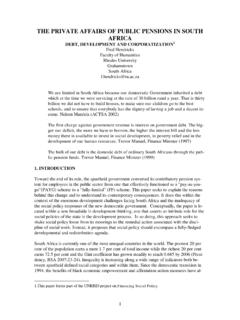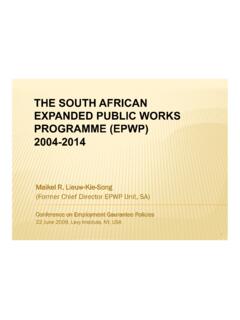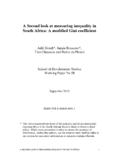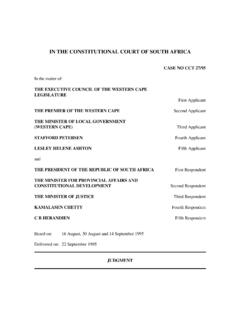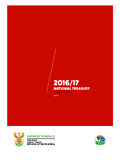Transcription of Pension Coverage and Informal Sector Workers - …
1 Please cite this paper as:Hu, Y. and F. Stewart (2009), " Pension Coverage andInformal Sector Workers : International Experiences",OECD Working Papers on Insurance and PrivatePensions, No. 31, OECD publishing, Working Papers on Insuranceand Private Pensions No. 31 Pension Coverage andInformal Sector WorkersINTERNATIONAL EXPERIENCESYu-Wei Hu*, Fiona StewartJEL Classification: G15, G18, G23, G28, J26*OECD, France Pension Coverage AND Informal Sector Workers : INTERNATIONAL EXPERIENCES Yu-Wei Hu and Fiona Stewart January 2009 OECD WORKING PAPER ON INSURANCE AND PRIVATE PENSIONS No. 31 Financial Affairs Division, Directorate for Financial and Enterprise Affairs Organisation for Economic Co-operation and Development 2 Rue Andr Pascal, Paris 75116, France 1 ABSTRACT/R SUM Pension Coverage and Informal Sector Workers : International Experiences Pension reform around the world in recent decades has focused mainly on the formal Sector .
2 Consequently, many of those working in the Informal Sector have been left out of structured Pension arrangements, particularly in developing countries a serious problem given this group are often low income earners, vulnerable to economic volatility and change. However, since the turn of the millennium, efforts in a range of countries have increasingly highlighted improving Pension Coverage for Informal Sector Workers . This paper provides an overview of selected country experience in this regard, and provides some suggestions for governments in developing countries considering implementing their own Pension reform to ensure that Informal Sector Workers receive the retirement income they need. JEL codes: G15 G18 G23 G28 J26 Keywords: compulsion, financial education, incentives, Informal Sector , micro finance, non-contributory, Pension Coverage , social assistance ** La couverture des travailleurs du secteur informel par les syst mes de retraite : exp riences au niveau international Les r formes des syst mes de retraite mises en uvre dans le monde au cours des derni res d cennies taient surtout centr es sur le secteur formel.
3 Beaucoup de travailleurs du secteur informel sont donc rest s l cart des r gimes de retraite institutionnalis s, en particulier dans les pays en d veloppement, ce qui constitue un probl me grave tant donn que ce groupe est souvent compos de travailleurs faibles revenus, vuln rables face l instabilit et au changement conomiques. Cela tant, depuis le passage au nouveau mill naire, un certain nombre de pays se sont de plus en plus attach s am liorer la couverture des travailleurs du secteur informel par les syst mes de retraite. Le pr sent document donne un aper u de l exp rience de quelques pays cet gard et formule, l intention des gouvernements de pays en d veloppement qui envisagent la mise en place d une r forme des retraites, des suggestions visant ce que les travailleurs du secteur informel b n ficient d un revenu suffisant au moment de la retraite.
4 Classification JEL : G15 G18 G23 G28 J26 Mots cl s : affiliation obligatoire, ducation financi re, incitations, secteur informel, micro-finance, non contributif, couverture des syst mes de retraite, aide sociale Copyright OECD, 2009 Applications for permission to reproduce or translate all, or part of, this material should be made to: Head of Publications Service, OECD, 2 rue Andr -Pascal, 75775 Paris C dex 16, France. 2 Pension Coverage AND Informal Sector Workers : INTERNATIONAL EXPERIENCES By Yu-Wei Hu and Fiona Stewart1 I. Introduction Modern Pension system can trace their roots back at least to late 19th century in Germany, when the Bismarckian social welfare system was introduced. Nowadays, pensions have spread and established around the globe, including in both developed and developing countries. Though the type of Pension system varies, all play an important role in providing necessary income to elderly populations and in alleviating post-retirement poverty among the poorest sectors of society.
5 However, despite the continued evolution and development of modern Pension system over the past century, one issue which is yet to be resolved is how to extend such structured pensions arrangement to Informal Sector Workers . Though the definition of this Sector varies by country, Informal Sector Workers are generally those with low incomes or self-employed, working in very small (unregistered) companies or the household Sector , often on a part-time basis (and migrant Workers ) in industries such as agriculture, construction and services2. Compared to Workers in the formal Sector - who normally join either mandatory or voluntary Pension systems, or both - those in the Informal Sector are typically not covered well (in many cases not at all) by modern, structured Pension systems. They do not have access to Pension plans organised or run by employers, may lack official registration papers or other documents which could help the relevant authorities target them for other schemes, may change job frequently and often live and work in rural areas which financial infrastructure is poor or non-existent.
6 These Workers may also come from lower income and educated groups, meaning their knowledge and understanding of Pension and saving products is limited and their resources for long-term savings scare. Hence gaining access to a structured Pension system is a challenge for these Workers . This issue is even more severe in developing countries, and indeed a rise in the Informal Sector has been correlated with economic growth in several regions3. The challenge is greater in these countries partly due to logistical difficulties in getting Informal Sector Workers to participate in Pension schemes, and partly due to the traditional role of family support in Pension provisioning. Recently both the international community and national governments have realised the increasing importance and urgency of extending the Pension system to the Informal Sector .
7 Indeed, a range of different policy initiatives have been undertaken, aiming to tackle this problem given the country-specific conditions and environments. This paper provides a comparative overview of these policies, and aims to provide practical international experiences to other governments considering such Pension reform initiatives. The remaining part of the paper is arranged as follows. Section 2 will give an overview of 1 The views expressed are the sole responsibility of the authors and do not necessarily reflect those of the OECD or its member countries. The authors are solely responsible for any errors. 2 See ILO definition 3 See ILO discussions 3 international experiences, organised by type of policy response, and focusing on Bangladesh, Chile, China, India, Kenya, South Africa and the United Kingdom (though other countries are referred to and cited), with further details of Pension arrangements and Informal Sector policies in these countries provided in the Appendix.
8 Section 3 provides some suggestions for governments particularly in developing economies - which are looking to promote Pension Coverage for their Informal Sector Workers . The last section concludes while summarising the main findings. It should be noted that this is intended as an overview paper and is by no means an exhaustive investigation of this challenging topic. The OECD acknowledges the leadership of other international organisations in this area (notably the ILO, and World Bank) and encourages interested readers to follow up with the reports referenced in the bibliography. II. Overview of international experiences This section provides comparative information on how countries have been working to extend Pension Coverage to the Informal Sector . The discussion will be presented by type of policy initiatives which have been undertaken or are being considered by governments.
9 It should be noted at the outset that it is possible that a government has adopted, or considered adopting, a combination of the following initiatives rather than a single policy. 1. Broadening access to social assistance programmes (non-contributory pensions) Before discussing ways to bring Informal Sector Workers into structured Pension systems (either mandatory or voluntary), it needs to be acknowledged that in reality in developing countries - particularly those with the lowest income levels - there is always a group of population whose main challenge is to meet basic needs, food, clothing and housing. Informal Sector Workers (including agricultural Workers ) in developing countries are an important component of such population groups. In this context, it could be very difficult (if not impossible) for governments to undertake any meaningful actions to bring these individuals into formal Pension systems.
10 Therefore, an important policy tool is to provide social assistance to all of the poorest elderly, on a non contributory basis. In general there are two approaches - means-tested and universal. Under the means-tested approach, only those who are too poor to support themselves are eligible for benefits, whilst under the universal approach all older people (subject to certain criteria but not levels of income and wealth) are entitled to receive such benefits. There has been much debate concerning the advantages and disadvantages on these two approaches, (for example the former may discourage people from working, while the latter distribute funds to not only those most in need but also relatively wealthier groups and can therefore be more costly and arguably less progressive and equitable), which is beyond the scope of this paper, but is discussed in some of the references in the bibliography at the end of the report.










